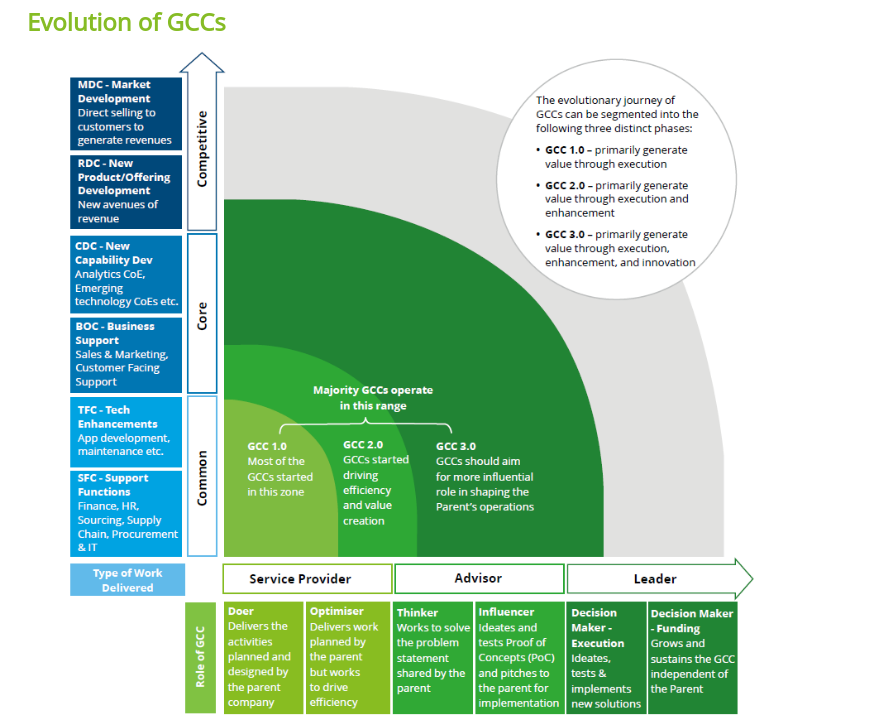Introduction
Global capability centers (GCCs) have become an established operating model for multinational organizations over the past three decades. GCCs originally started as offshore centers focused on back-office support functions as a cost optimization play. However, GCCs have progressively evolved to take on more complex and strategic roles over the years. Leading GCCs are now transforming into global value organizations that drive innovation, insights, and business outcomes for their parent organizations.
The evolution of GCCs can be split into three distinct phases, the initial phase where GCC generates value through execution, a second phase where GCC generates value through execution and enhancement, and a third phase where GCC generates value through execution, enhancement, and innovation, as shown in the image below from Deloitte.

Source: Deloitte GCC value proposition for india
The Rise of Global Capability Centers
GCCs first emerged in the 1980s as companies looked to reduce operating costs for essential business processes like IT maintenance, customer service and financial functions. Early movers established GCCs in offshore locations like India, Philippines, Poland, China, and Mexico to access abundant talent at lower costs. Throughout the 1990s, an increasing number of companies set up GCCs focused on call centers, IT infrastructure management and basic finance & accounting processes.
Over the years, the scope of GCCs expanded beyond basic tasks to more complex work. Companies realized that offshore talent could handle much more than routine jobs. Locations like India had rich availability of skilled professionals like developers, analysts, researchers, accountants, and technicians – all at a fraction of the costs in developed countries. GCCs grew rapidly as multinationals enhanced capabilities in software development, analytics, equity research, financial modelling, and other higher-value work.
Drivers of Global Value Organizations
While GCCs started off as tactical cost saving centers, they have progressively evolved into strategic global value organizations:
Integrated Global Services: Instead of operating as isolated offshore delivery centers, GCCs today provide integrated services delivered seamlessly across locations. This required enhancing capabilities beyond basic tasks.
Talent and Expertise Development: The offshore talent pool has gained specialized domain skills like underwriting, data science, engineering, and supply chain expertise, enabling them to be drivers of business growth and innovation.
Leadership Vision: Heads of leading GCCs focused on expanding scope from cost focus to driving innovation, customer insights, and owning end-to-end processes.
Technology Leverage: Advancements in global connectivity, cloud platforms and collaboration tools enabled GCCs to operate seamlessly across geographies.
Strategic Benefits of Transitioning into GVOs
Forward-looking companies have realized tangible benefits by nurturing their GCCs into GVOs:
Cost savings plus innovation: GVOs drive efficiencies through process excellence while also contributing to new product development and IP creation. Costs saved range from 25% to 40%.
Rich insights: By owning core business processes, GVOs can provide data-driven insights back to business teams using analytics.
Talent magnets: GVOs attract and develop specialist talent that can seamlessly augment innovation centers and R&D labs across the world.
Enhanced agility: GVOs improve business agility by effectively coordinating processes across multiple locations 24×7.
Conclusion
GCCs have come a long way from being focused on labour arbitrage and cost savings. The combined talent pool across verticals that India offers has made GCCs part of long-term strategies of mid & large corporations across the globe while smaller organizations are waking up to the cost arbitrage available in India. Leading GCCs have successfully transitioned into integrated GVOs that combine domain expertise, technology leverage and talent depth to drive value beyond just costs. The evolution has been mutually beneficial – creating growth opportunities for offshore locations while enabling global enterprises to derive strategic advantages. We at Astravise help our clients leverage the vast talent pool across verticals, domain expertise and technology to set up a GCC that has the potential to transform into a GVO.



